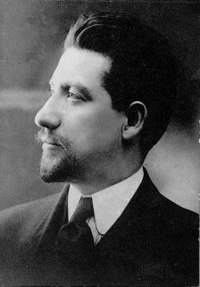Carlo Tresca
| Carlo Tresca | |
|---|---|

Tresca, photographed in 1910
|
|
| Born | March 9, 1879 Sulmona, Italy |
| Died | January 11, 1943 (age 63) New York City, New York, U.S. |
| Occupation | Newspaper editor and labor leader. |
| Children | Peter D. Martin |
Carlo Tresca (March 9, 1879 – January 11, 1943) was an Italian-American newspaper editor, orator, and labor organizer who was a leader of the Industrial Workers of the World during the decade of the 1910s. He is remembered as a leading public opponent of fascism, Stalinism, and Mafia infiltration of the trade union movement.
Born, raised and educated in Italy, Tresca was editor of an Italian socialist newspaper and secretary of the Italian Federation of Railroad Workers before he emigrated to the United States in 1904. After a three-year spell as secretary of the Italian Socialist Federation of North America, he joined the Industrial Workers of the World in 1912, and was involved in strikes across the United States over the rest of the decade. He was jailed in 1925 after printing an advertisement for a birth control pamphlet in one of his newspapers.
During the 1930s Tresca was a staunch critic of both Benito Mussolini's fascist government in Italy and Stalinism in the Soviet Union. In 1937 he was a member of the Dewey Commission, which cleared Leon Trotsky of all charges made during the Moscow Trials. Tresca also used his newspapers to mount a public campaign criticising the Mafia. In January 1943, in New York, he was assassinated, probably by a Mafia gunman.
Carlo Tresca was born March 9, 1879 in Sulmona, Italy, the son of a landowner. Tresca attended primary, grammar, and high school in Italy. Tresca had no hope of attending university as his family's finances were poor during the economic slump of the 1880s. He studied at a seminary instead, but left soon after, emerging as an anticlerical atheist.
From 1898 to 1902, Tresca was secretary of the Italian Federation of Railroad Workers. He was also the editor of Il Germe, a socialist weekly based in Abruzzo. Seeking to avoid a jail term for his radical political activities, Tresca emigrated to America in 1904, settling in Philadelphia.
...
Wikipedia
